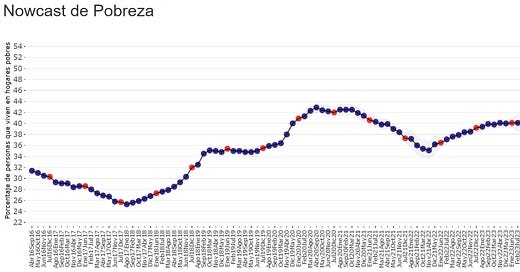Poverty 'Almost Halved' in Argentina Under Milei's Reforms
If humans are serious about alleviating global poverty, we need to be honest about how wealth is created.
It was a good year for Argentina and its president, Javier Milei. In 2024, Argentina saw impressive economic progress as Milei slashed bureaucracy, eliminated regulations, closed superfluous departments, reduced the federal workforce, and instituted various monetary reforms.
The results of the policies were impressive: monthly inflation, which peaked after Milei assumed office, fell from 25.5% to 2.4%; Argentina’s economic recession ended; and the government saw its first budget surplus in 14 years.
Still, Milei’s opponents were quick to point out an area where the country continued to struggle: poverty. When Milei assumed office, poverty in Argentina was already north of 40%, but that rate peaked at 52.9% in the first half of 2024, the highest rate in Argentina in almost 20 years.
Even though Milei whipped inflation, balanced the government’s budget, and ended a recession — Argentina’s economy was growing again — the media headlines were brutal.
“Argentina records sharp rise in poverty,” the BBC reported.
“Poverty in Argentina soars to over 50% as Milei’s austerity measures hit hard,” the Guardian wrote.
“Argentina’s poverty rate spikes in first 6 months of President Milei’s shock therapy,” the Associated Press declared.
Five months later, new data are in, and the outlook is far less grim, according to a pair of new reports highlighted by the Buenos Aires Times.
The first dataset came from measurements conducted by economist and Universidad Torcuato Di Tella lecturer Martin Gonzalez-Rozada, whose monthly analysis indicates a 16.1 percentage point drop in poverty from its peak.
“The projected incidence can be mechanically broken down into a weighted average of a poverty rate of 51.2% for the month of June, 38.8% for the third quarter of 2024, and 38.0% for the two-month period of October-November,” Gonzalez-Rozada posted on X.
The data suggest that around 37% of people live in poor urban households or about 11 million people. When compared to previous reports, the data suggest that destitution “almost halved” during the last six months of 2024.
The government’s National Council for the Coordination of Social Policies, working in collaboration with the Human Capital Ministry, found similar results, with estimates showing poverty “declining to 38.9 percent in the third quarter of 2024.”
These results are nothing short of miraculous and exceed what even Milei’s most outspoken supporters would have dared hope. Yet you’ll find no reporting in the BBC, the AP, or the Guardian about it. In fact, you’ll not find the results in any media besides the Buenos Aires Times (and now here in the Washington Examiner).
One could argue that perhaps the reason for the silence is this is not “official” data since INDEC — the National Institute of Statistics and Census of Argentina, a public body within the Ministry of Economy that publishes all statistics — does not release its report until mid-March. The problem with this argument is that media outlets had little problem reporting preliminary or nongovernment data when the figures showed poverty increasing.
There seems to be an overt effort to ignore the economic transformation that is taking place in Argentina under Milei. News organizations are free to cover whatever stories they wish, of course, and I won’t speculate here as to why so many are choosing to ignore this story. However, I will say what’s happening in Argentina is a very important story and one Americans should be paying attention to.
If humans are serious about alleviating global poverty, we need to be honest about how wealth is created. Fortunately, the economic story unfolding in Argentina is becoming increasingly difficult to ignore.
Free-market economics is doing in Argentina what it has done in countries such as Hong Kong and Ireland to former Soviet Bloc nations such as Estonia and Poland — revitalizing struggling economies ravaged by collectivism.
With Americans facing their own economic challenges — a spiraling national debt, a wobbling currency, exploding entitlement costs, and debt interest payments that now exceed a trillion dollars annually — they would do well to observe events in Argentina.
This includes not just Argentina’s economic recovery but the resistance from doubting economists and rent-seekers who oppose the free-market reforms that have proven so successful. Adam Smith once observed that the formula for prosperity is surprisingly simple: “peace, easy taxes, and a tolerable administration of justice.”
Americans and Argentines today see how right Smith was.





I think we all know why the media is choosing to ignore this story. Any successes that involve capitalism, free markets, populism and what the media calls right wing is ignored, buried or explained away. It’s all narrative control. All that USAID money for media and those untraceable US gov’t payouts, gee I wonder where that media money ended up???